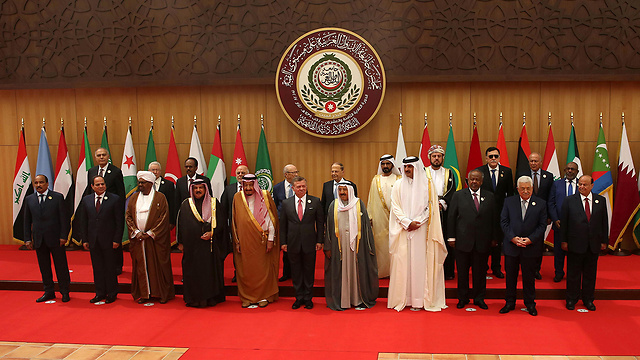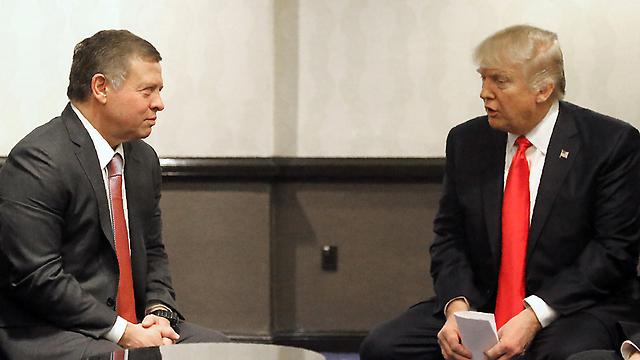Analyzing the Arab League summit in Jordan and all the unfolding drama that took place on the sidelines, US President Trump’s advisors would do well to recommend that their boss work towards promoting economic projects before starting peace talks when he meets with Arab leaders this week.
The meetings held on the sidelines of the Arab League summit in Jordan are much more interesting than the concluding statement. While the Arab League secretary general was reciting the 17 resolutions, three leaders (the presidents of Yemen, Djibouti and Kuwait) were caught on camera in a deep sleep. At the same time, a long line was forming before the special American envoy.
Jason Greenblatt came to work around the clock on the Jordanian side of the Dead Sea. The results: Egyptian President Abdel Fattah al-Sisi landed in Washington Saturday for a proper working meeting with US President Donald Trump, Jordan’s King Abdullah II will arrive in the middle of the week, and at the end of the month it will be Palestinian President Mahmoud Abbas’s turn.

Officially, sources on the Arab side claim, the keys for restarting the peace process are already in the ignition. After the summit wiped the dust off the Saudi peace initiative, all it takes is turning the key.
Egypt will get the leading role, Jordan is defined as a “key partner,” and, Israel will remain an onlooker from the sides that will occasionally make its interests known. Trump’s team is rolling up their sleeves to assemble the negotiating table. That’s the reason why Abbas, the least significant player, was the last one invited to the White House.
Morocco’s king, who has lost interest in Arab summits, is the only one who blew off the conference without apologizing. The Jordanian intelligence chief, Faisal al-Shoubaki, had taken his king on an embarrassing, last-minute flight to beg at Mohammed VI’s palace in Rabat. Al-Shoubaki paid the price: He was dismissed.
All eyes were fixed on Jerusalem. When Prime Minister Benjamin Netanyahu responded to the Arab summit with an alternative settlement for the Amona evictees, the Arabs were furious.
The leaders of the Arab world have erased “normalization” from their lexicon. They now say “historic pan-Arab reconciliation,” on the condition that Israel agrees or that Trump makes Netanyahu accept the two-state solution and Israel commits to a full withdrawal to the 1967 borders.
In simpler words, when the Right starts exerting pressure, the Arabs will have an excuse: Cooperation from the Arab side will be as abundant as Israeli concessions. The more Netanyahu sticks to his positions and the more Trump lets him off the hook, the more the Israeli-Palestinian conflict will remain gridlocked.

There’s another aspect to the White House meetings that is equally important. When commentators point to al-Sisi’s “good chemistry” with Trump, they are referring to a relationship based on financial interests. Regardless of any diplomatic progress on this front, Egypt must not be allowed to fall.
It’s no secret that Egypt is stuck in a state of economic distress. You don’t have to be an expert to conclude that an angry and hungry crowd is likely to return to the streets.
The situation in Jordan is pretty similar. Trump, unlike Obama, is unmoved by the situation of human rights in our region. He sees the numbers, and Israel is helping him understand that his administration must strengthen the regimes.
At a dramatic moment, we saw the Egyptian president leave the summit when the Qatari leader began speaking. This wasn’t just an exit for show to indicate the quarrel between the two countries. It’s important to identify the American meddling behind the scenes and the reprimands to the Saudi king’s son which led to a reconciliation between King Salman and al-Sisi.
Here’s the deal: If the Saudi king is interested in teaming up with the Trump administration and if the shadow of the Iranian threat is hovering over everyone’s heads, then Saudi Arabia is required to sign up and contribute its fair share. Here, on the sidelines of the summit, they managed to return the oil shipments to Egypt, and on the way, they’ll open their wallets and help the Jordanian king as well.
We’re not the only ones with pessimists. No threats were made, but Netanyahu was still hit by the Jordanian king big time. Abdullah insisted on warning, “Israel is undermining the chances of peace.”
The way things look, Trump is beginning to realize that he’s received a complex package. While his advisors are searching for a formula, my recommendation is to reverse the order: Refuel the political process through the bread and butter. First set financial projects and economic incentives in motion, and only bring everyone back to the table after those have taken root.
As reported by Ynetnews
